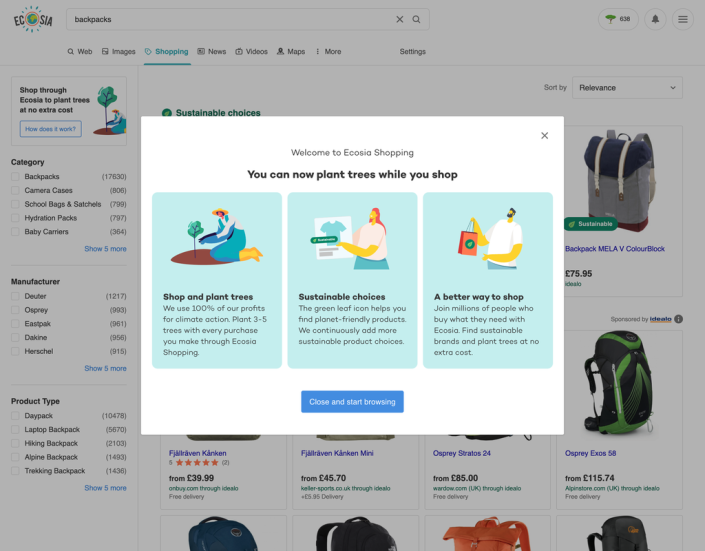Ecosia, the search engine that uses its profits to plant trees, launches a new shopping feature.
The company, which was founded in 2009, donates its available funds to tree planting organizations. He claims to have planted 130 million trees in 30 countries around the world.
Ecosia Shopping recommends products on Amazon, Kelkoo and Idealo, and other business partners that have been sustainably manufactured, reused, or have been refurbished. The feature is now available in UK, Germany and France.
The search company takes a small percentage of those affiliate links (between two and five percent) and uses the income to continue its green effort.
It typically takes around 50 searches to raise money to plant a single tree, Ecosia says, but its new Shopping feature could raise those funds much faster depending on the price of the products purchased.
In collaboration with the Technical University of Berlin and the Berlin University of Technology, the researchers are selecting a range of green alternatives for the 20 main product categories – including backpacks, clothing and sportswear – to recommend at the top of their search results. Over time, Ecosia will introduce more categories to provide consumers with greener choices.

Changing the search preferences of consumers is a huge task for Ecosia. Google has a virtual monopoly on the research market, with 92 percent control from November 2021. Microsoft’s Bing, the second search engine that provides the algorithm used by Ecosia, holds just under 4.5% of the shares in comparison.
For the company, “the big challenge is to get people to break their buying habits,” said Christian Kroll, founder and CEO of Ecosia. The independent. “A lot of people just go to Amazon, now they have to go to Ecosia.”
Ecosia’s partnership with Amazon may raise eyebrows for sustainable buyers; the The shopping giant was recently found to be destroying millions of items – including smart TVs, laptops, drones, and more. – per year, rather than donating it. Amazon claimed that “no items are sent to UK landfill” and that “as a last resort, [it] will send items to energy recovery â€.
Mr Kroll says Ecosia had “great discussions” about working with Amazon, but in order to have “the greatest impact possible” it was working with them due to consumer demand for convenience, good price and choice – even for green people. purchases.
“We have very little time and I think we cannot be ideologues in all areas,” he said, with the company “hav[ing] choose what fundamentally solves the problem the fastest â€.
The need for mindful consumption is an increasingly pressing concern for buyers, according to the researchers. “Buyers are increasingly conscientious and place greater value on sustainability in their choices. Our data shows that consumers increasingly want to buy from retailers who share their values, even if it costs them more, â€said Brian Green, solutions manager at Adobe who collects data on buying habits. The independent.
More than a third of UK shoppers buy from small retailers because of their lower environmental footprint, while one in four plan to buy second-hand items as Christmas approaches. “Products marketed as sustainable are growing more than five times faster than those that are not,†he added. “It’s clear that people want to buy for a good cause, and retailers should definitely take note. “
However, tackling climate change doesn’t just mean that consumers are making greener choices when shopping; it also means buying less and “disrupting our current production and consumption patterns,†according to Dr Teresa Domenech Aparisi, senior lecturer in industrial ecology and circular economy at University College London.
The material consumption of the world’s cities is expected to increase from 40 billion tonnes in 2010 to around 90 billion tonnes in 2050, according to the International Resource Panel.
“While there is a need to educate citizens and provide information to inform better choices in terms of sustainability, it is also important to stress that the best sustainable choice is always to avoid buying something you don’t want. don’t need it, â€Dr. Domenech said. The independent.
Even pushing for a new shopping feature, Mr. Kroll agrees with this assessment. “The best buy is not to buy at all,†he said, but traditional buyers are “quite a ways†from this extreme.
“We need to give users a little push – and there are probably a few users who are probably ready to go a lot further and drastically reduce their overall consumption – [because] there are a lot of people starting their sustainability journey and for them it would be a big, big thing if, for the first time in their life, they actually bought a refurbished product.
Read more
How to stop your cat from climbing your Christmas tree
Register for The Independent’s Free Cryptocurrency Expert Panel Event
Dogecoin price rises after Elon Musk’s tweet – follow live
Register for The Independent’s Free Cryptocurrency Expert Panel Event

